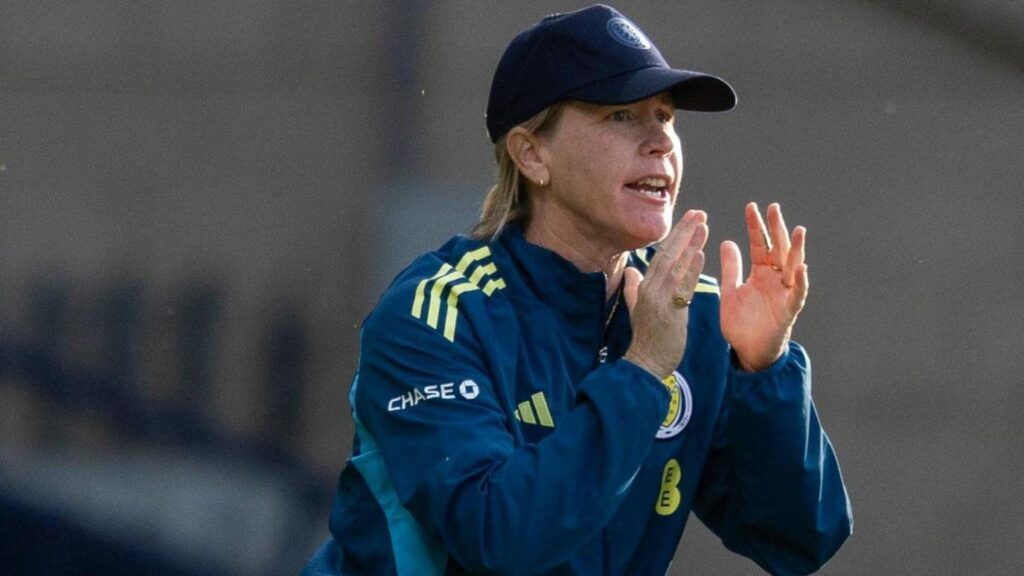Melissa Andreatta’s inaugural match as head coach of the Scotland women’s football team did not go as planned, resulting in a disappointing defeat to Austria at Hampden Park. The match, featuring a solitary goal from Julia Hickelsberger, solidified Scotland’s relegation to Nations League B. This grim outcome has led many to question the state of the team, especially after a series of unfortunate results in previous matches. Upon reflecting on the experience, Andreatta remarked, “I think I have a good baseline now to understand where we’re at,” indicating a recognition of the challenges ahead.
Andreatta, who formerly served on the coaching staff for the Australian national team, was thrust into the role following a tumultuous stretch for Scotland, where they lost their first four fixtures of the year and conceded a troubling 13 goals. The most concerning of these was a 6-0 rout against Germany, leaving a notable impression on the squad. Describing her initial thoughts post-match, Andreatta expressed uncertainty about whether her assessment of the team’s capabilities met her expectations. “I’m not sure, if I’m honest,” she noted, further emphasizing the need for introspection after what many saw as a lackluster performance against Austria.
In the opening half, the Scots seemed overpowered, ceding control to the visitors, who established footholds in the match early on. Scotland’s goalkeeper, Lee Gibson, who was notably awarded the player-of-the-match title, acknowledged the struggle for her teammates, describing their efforts as “too little, too late.” This performance pointed to the realization that turning around Scotland’s fortunes will be a gradual process rather than an instantaneous one.
The defeat serves as a critical reminder of the deep-rooted issues plaguing the Scotland women’s squad. The mentally taxing aftermath of their recent Euro 2025 playoff loss against Finland hangs heavily over the squad. Over the course of the year, players’ confidence has evidently dipped, leading to uncharacteristic mistakes on the pitch. The former Scotland midfielder Leanne Crichton described the team’s play as “fragmented,” further supported by Andreatta’s observations of a persistent “hangover” from prior matches.
Despite harrowing results, there were glimpses of promise among the younger players. As veteran defender Rachel Corsie made her impact felt, the emergence of fresh talent like 22-year-old Kathleen McGovern and debutant Mia McAulay brought a youthful vigor into play. McAulay, in particular, displayed creativity that was sorely lacking in the first half, indicating a potential shift toward a more dynamic squad under Andreatta’s stewardship.
Andreatta’s presence goes beyond technical adjustments; her commitment to Scottish culture and football has been refreshing. Engaging with local food and attending numerous SWPL games, she has immersed herself in her new role with enthusiasm. “I’ve got a baseline now,” she highlighted with apparent optimism, asserting her determination to instill a renewed sense of belief within the squad.
Moving forward, the task at hand will require strengthening individual player confidence while developing tactical coherence. With one more match against the Netherlands on the horizon, the coach is prioritizing the restoration of morale and unity within the team. While the weight of recent performances lingers, Andreatta’s optimism suggests that the belief still exists within the squad and that hard work will be the path to achieving success.
In conclusion, Andreatta’s debut served as a sobering reminder but also as a springboard for potential growth. With youth proving its worth and Andreatta’s dedication apparent, there is hope that Scotland can emerge from this dark chapter. Realistic expectations tempered with a focus on building steadily over time will be key as the Scots aim to find their footing once more in women’s football.



